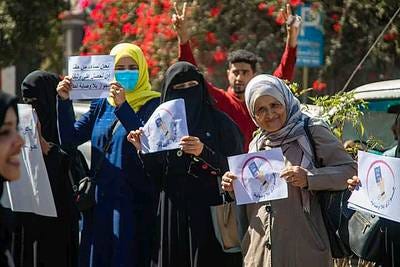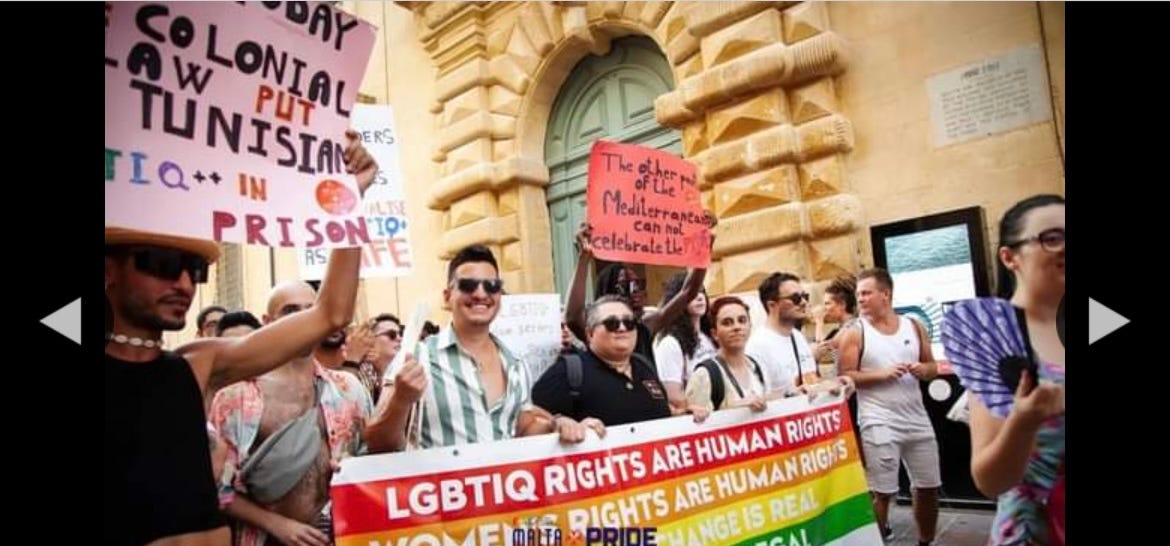Global Roundup: 1st Woman on Yemeni Supreme Judicial Council, Malta Free Gender Affirming Surgery, Vanuatu Fight for Gender Equality, Decriminalizing Homosexuality in Sri Lanka, Serbia LGBTQ Community
Curated by FG contributor Inaara Merani
Activists demanding the abolition of guardianship on women's passports during a protest in front of the Passports and Immigration Building in early February 2022, in the city of Taiz, Southern Yemen. Photo via The National
For the first time in Yemeni history, a woman has been appointed as a judge to the Supreme Judicial Council. Sabah Al Alwani was appointed on August 4th and has demanded more action to narrow the country’s gender gap.
In 2014, the Houthis took over Sanaa, the capital of Yemen, and the country remains in a state of war. Hundreds of thousands of people have died and millions have been displaced – the situation in Yemen is often called the world’s worst humanitarian crisis. Amidst the crisis in Yemen, Ms Al Alwani is hopeful for the future of Yemeni women with her new appointment.
It’s one step on the path to empowering Yemeni women. I was pleased with the decision. This is the first time that women are represented in such a high position in the country’s history. Appointing me or any other woman to any leadership or decision-making position constitutes a major step in the right direction. – Sabah Al Alwani
Ms Al Alwani’s appointment is the second major step the Yemeni government has made to narrow the gender gap, the first being a set of reforms made in February. In the city of Taez, located in the southern part of the country, women were able to successfully overturn the need to submit their male guardian’s approval to obtain a passport, through a series of meetings with officials. This change was monumental, allowing women to be able to finally travel abroad on their own to pursue an education, or even receive medical care in another part of the world. Ms. Al Alwani was then part of the delegation that met Prime Minister Maeen Abdulmalik Saeed which prompted him to order the government to review the procedures for women obtaining a passport.
The timing of my appointment, months after the formation of the Presidential Council, demonstrates the council's readiness to promote women's participation in senior positions, – Sabah Al Alwani.
Although these changes will positively impact the lives of Yemeni women for years to come, they do not directly address more pressing issues. For example, many Yemeni women suffer from malnutrition and lack of access to healthcare and may be subject to forms of sexual violence due to the ongoing humanitarian crisis. Still, the appointment of Sabah Al Alwani is a step in the right direction for women in Yemen.
Photo via EuroPride Valletta 2023 - Malta Pride
This week, Malta’s Prime Minister confirmed that the country would begin offering free gender-affirming surgery. After attending Malta’s Pride event over the weekend, Prime Minister Robert Abela shared the news of the changing landscape for the LGBTQ+ community in Malta. In addition to offering free gender-affirming surgery, the PM also spoke about how the ban on gay men donating blood had been recently lifted.
Today we will fulfill another electoral promise with new protocols for donating blood. That way we will have fairer protocols that remove any form of discrimination with LGBTIQ+ people where the parameters for a person to be able to donate blood will be equal for everyone. – Malta Prime Minister Robert Abela
Malta is known as Europe’s most progressive country for LGBTQ+ rights. These changes demonstrate the willingness of the government, as well as Maltese society to create an inclusive and unbiased space.
My presence yesterday, as well as that of ministers and MPs, symbolises the messages that while we have done a lot, more is yet to come. While we’re proud of what we did, more needs to be done. Pride Week should serve not only to remember with pride what we have achieved in recent years, but also to understand that the work in favour of equality can never stop. – PM Robert Abela
While this new step in Malta is welcome news, the country continues to criminalize abortion. It is imperative the Maltese prime minister gain an understanding of intersectionality as the path to true equality. That is the lesson that feminism teaches, everywhere.
One of the creative workshops run as part of Sista’s Strong Mama Program. Photo via IWDA
Yasmine Bjornum created the Vanuatu-based online magazine, Sista, in 2016, desiring to create a space for Ni-Vanuatu women to connect and uplift one another, and to come together to discuss the issues affecting them. Sista has since evolved into a women’s rights organization, shining a light on the issues affecting Ni-Vanuatu women and amplifying their voices.
Yasmine created Sista based on her own personal experience – she was living in Sydney when she found out she was pregnant but realized she had little knowledge of the issues commonly experienced by single mothers, as well as pregnant people in general. Growing up in Vanuatu, the education surrounding women’s rights, sexuality, and gender identity was very limited.
In our language we don’t have any words for lesbian, gay, bisexual transgender. We don’t have words for anxiety, depression, any mental health issues, let alone words to discuss feminist theory or anything related to that – in Bislama we just don’t have that. And if we don’t have the words, how can we change the narrative? That experience of recognising the opportunities that I was being given in Australia versus what would have happened to me if I was back home really made me understand for the first time that gender inequality does exist and we do have an issue with how we treat women. – Yasmine Bjornum, founder of Sista
Recognizing the lack of knowledge about gendered issues, as well as a number of barriers Ni-Vanuatu women endure to this day (lack of women in government, low women employment rates, unpaid work, high rates of gender-based violence), Yasmine began using arts and media as a medium for change.
In a country unwilling and unable to facilitate change, Sista has used creative ways to support women. For example, the Yumi Gat Style fashion show in 2021 showcased local fashion designers and opened up conversations around gender norms, body positivity, and the diversity between Ni-Vanuatu women. And, the Strong Mama Program held workshops for single mothers, in which these women could come together and share their experiences and struggles with one another, while also providing them with the tools to navigate these troubles.
A photo from the Yumi Gat Style fashion show organized by Sista in 2021. Photo via IWDA
For years, Sista has created a space for Ni-Vanuatu women and the LGBTQ+ community to come together and create a new chapter in Vanuatu’s history. Yasmine has emphasized how tradition and culture can exist alongside the progress that Sista seeks; the organization believes in reclaiming culture and embracing Vanuatu values while also moving forward into a space where gender inequality is not perpetuated, and where everyone can exist.
Photo via Ground Views
A bill to decriminalize homosexuality was recently proposed to the Sri Lankan parliament by MP Premnath C Dolawatte, a private member of the parliament. This week, Sri Lankan President, Ranil Wickremesinghe, said that the government will not oppose the bill, which is a hopeful step forward for the LGBTQ+ community in Sri Lanka.
Current laws in Sri Lanka ban same-sex relationships, and other discriminatory laws exist that target trans people and sex workers. Dolawatte’s bill would decriminalize same-sex sexual activities between consenting adults. Although the President’s support would be influential, the support of individual members is also needed.
The Sri Lankan government has been recently accused of a number of physical and sexual assaults against members of the LGBTQ+ community, and the LGBTQ+ community has questioned how committed the government is to supporting LGBTQ+ rights. However, with President Wickremesinghe’s recent election into office in July, there is hope that his support for LGBTQ+ rights will pave the way for the Sri Lankan LGBTQ+ community.
Tensions have been simmering in Belgrade ahead of Saturday's planned EuroPride march Andrej ISAKOVIC AFP/File. Photo via France 24
Every year, EuroPride is hosted in a different city; this year, Belgrade, Serbia was selected. However, Serbian President Aleksandar Vucic has demanded that the EuroPride march, scheduled for this Saturday be cancelled. Despite these threats, the Serbian LGBTQ+ community has promised to go ahead with the plans.
If it’s banned, we will walk nevertheless. – Goran Miletic, one of the Belgrade Pride organizers
In Serbia, gay marriage is not legal and homophobia is rampant throughout the nation. Right-wing political and religious groups strongly oppose LGBTQ+ rights. Some groups have now threatened to stage a counter-demonstration at EuroPride. Despite the homophobic sentiment that exists, Serbia has been able to host Pride events for the last eight years without any incidents.
Prime Minister Ana Brnabic is openly gay, and was appointed by Vucic in 2017, yet the President still remains largely opposed to same-sex relationships. Some critics have speculated that the President’s threats were intended to divert nationalist actors away from the deal he made with Kosovo, as they came just hours before a breakthrough deal was announced where Serbia conceded in the fight for Kosovo.
Although many are feeling uneasy about the President’s threats and potential counter-demonstrations, the Serbian LGBTQ+ community and allies are committed to attending EuroPride and continuing to fight for LGBTQ+ rights.
Freedom can only be universal,..Either we are all free, or nobody is. – Nemanja Babic, Belgrade resident
Inaara Merani (she/her) recently completed her Masters degree at the University of Western Ontario, studying Gender, Sexuality, and Women’s Studies with a specialization in Transitional Justice. In the upcoming years, she hopes to attend law school, focusing her career in human rights law.
Inaara is deeply passionate about dismantling patriarchal institutions to ensure women and other marginalized populations have safe and equal access to their rights. She believes in the power of knowledge and learning from others, and hopes to continue to learn from others throughout her career.







